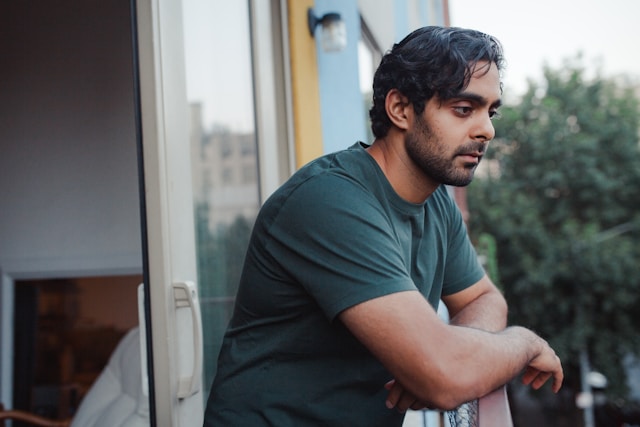Trusting yourself seems like it should be natural, but for some people, it’s anything but.

If you’ve ever second-guessed your choices, constantly looked for reassurance, or felt unsure about your own instincts, you’re not alone. You may not have big, obvious moments of self-doubt; sometimes it’s the little things that reveal your lack of trust in yourself. Those who aren’t 100% sure of themselves tend to do these things, often without even realising they’re doing them. You might relate to a few of these yourselves.
1. They overthink even the smallest decisions.

Choosing what to wear, where to eat, or which email to send shouldn’t feel overwhelming, but for someone who doesn’t trust themselves, even minor decisions can feel huge. They go back and forth, analyse every option, and second-guess whether they’re making the “right” choice. They’re not just indecisive; they’ve got a deeper fear of getting things wrong. When you don’t trust yourself, even simple choices feel like potential mistakes waiting to happen.
2. They constantly ask for other people’s opinions.

There’s nothing wrong with asking for advice, but if someone can’t make a decision without running it by multiple people first, it’s often a sign they don’t trust their own judgement. They might assume that other people know better than they do, or worry that they’ll make a mistake if they don’t get input. However, relying too much on outside opinions can actually make self-trust even weaker over time.
3. They replay past mistakes over and over.

Everyone messes up, but people who struggle to trust themselves don’t let their mistakes go. Instead, they keep replaying them in their minds, analysing what they should have done differently. That constant self-criticism makes it harder to trust themselves in the present. When your mind is filled with reminders of past failures, it’s hard to believe you’ll get things right next time.
4. They change their minds a lot.

Making a choice is one thing, but sticking to it is another. Someone who doesn’t trust themselves might make a decision, then immediately start doubting it and switch to something else. That back-and-forth pattern comes from a fear of making the wrong choice. They might feel relief for a moment, but constantly changing their mind only reinforces the idea that they can’t trust their own judgement.
5. They have a hard time saying no.

People who struggle with self-trust often second-guess their boundaries. They might feel like saying no is the right thing to do, but doubt creeps in. What if they’re being too sensitive? What if they’ll regret it? Instead of trusting their initial instinct, they give in, saying yes when they really want to say no. After a while, this destroys their confidence even more, making it harder to stand by their choices.
6. They apologise for things that don’t need an apology.

Someone who doesn’t trust themselves tends to assume they’re in the wrong, even when they haven’t done anything wrong. They might say sorry for speaking up, for taking up space, or even for things completely out of their control. It’s often a habit rooted in self-doubt—the belief that they must be the problem, even when they’re not.
7. They second-guess their feelings.

Instead of just accepting their emotions, they question whether they’re overreacting or being unreasonable. They might tell themselves things like, “Maybe I’m just too sensitive” or “Maybe I’m making a big deal out of nothing.” That constant self-doubt makes it hard for them to trust their gut instincts, leaving them unsure about whether their feelings are valid or not.
8. They avoid making decisions whenever possible.

Because decision-making feels stressful, they often prefer when someone else takes the lead. Whether it’s letting a friend pick the restaurant or following a coworker’s plan without input, they feel more comfortable when they don’t have to be the one to decide. It’s not that they don’t have opinions; it’s that they don’t trust their opinions enough to act on them.
9. They struggle with self-doubt even after making the right choice.

Even when everything works out just fine, they still wonder if they did the right thing. They might replay the situation in their mind, looking for ways they could have done it better. Instead of celebrating their success, they focus on what could have gone wrong. It’s almost like they don’t trust themselves enough to believe they made a good call.
10. They assume other people know better than they do.

Whether it’s friends, family, or even strangers, they tend to assume that other people’s opinions are more valid than their own. They might assume that if someone disagrees with them, they must be wrong. Trusting yourself means believing that your thoughts and instincts are just as valuable as anyone else’s, but for someone who struggles with self-trust, that feels impossible.
11. They hold onto regret for far too long.

Regret lingers longer for people who don’t trust themselves. They replay moments where they wish they had done something differently, feeling like they can’t trust themselves not to make the same mistake again. Instead of learning and moving on, they get stuck in a loop of self-blame, which only makes trusting themselves even harder.
12. They hesitate before making even simple choices.

Someone who struggles with self-trust often hesitates before answering a simple question, like what they want to eat or which movie they want to watch. They pause, thinking through every option, afraid of making the “wrong” choice. They don’t realise that sometimes, there is no wrong choice; it’s just about making a decision and moving forward.
13. They feel anxious about speaking up.

Even when they have something valuable to say, they hesitate. They wonder if their thoughts are worth sharing, if they’ll sound silly, or if people will judge them. That fear of getting it “wrong” often outweighs the desire to be heard.
This anxiety keeps them quiet, even when they want to contribute. As time goes on, it makes them feel even more disconnected from their own voice, leading them to question whether their opinions matter at all. The longer this goes on, the harder it becomes to break that silence and reclaim their space.
14. They replay conversations, worrying about what they said.

After a social interaction, they overanalyse everything. They wonder if they sounded off, if they offended someone, or if they should have phrased something differently. Even casual chats can spiral into internal stress.
Even when there’s no evidence that anything went wrong, they convince themselves that they must have messed up somehow. The constant replaying of conversations reinforces the belief that they can’t be trusted to say the right thing, creating even more hesitation the next time they’re around other people.
15. They struggle to trust their own happiness.

Even when things are going well, they might feel like it’s too good to be true. They wait for the other shoe to drop, second-guessing whether it’s real or whether they deserve it.
That unease keeps them from fully relaxing into joy. Instead of soaking in happiness, they analyse it, fearing that trusting it will leave them vulnerable to disappointment. However, trusting your happiness is part of trusting yourself—and learning to let the good moments simply be good is one of the most healing things you can do.




